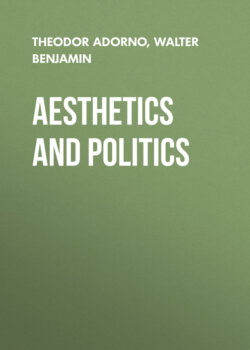Aesthetics and Politics

Реклама. ООО «ЛитРес», ИНН: 7719571260.
Оглавление
Theodor Adorno. Aesthetics and Politics
AESTHETICS AND POLITICS
Contents
Presentation I
Ernst Bloch. Discussing Expressionism
Georg Lukács. Realism in the Balance
Presentation II
Bertolt Brecht. Against Georg Lukács
Walter Benjamin. Conversations with Brecht
Presentation III
Theodor Adorno. Letters to Walter Benjamin
Walter Benjamin. Reply
Presentation IV
Theodor Adorno. Reconciliation under Duress
Theodor Adorno. Commitment
Fredric Jameson. Reflections in Conclusion
Notes
Index
Отрывок из книги
AESTHETICS AND POLITICS
with an afterword by
.....
One inescapable consequence of an attitude alien or hostile to reality makes itself increasingly evident in the art of the ‘avant-garde’: a growing paucity of content, extended to a point where absence of content or hostility towards it is upheld on principle. Once again Gottfried Benn has put the situation in a nutshell: ‘The very concept of content, too, has become problematic. Content – what’s the point of it nowadays, it’s all washed up, worn out, mere sham – self-indulgence of emotions, rigidity of feelings, clusters of discredited elements, lies, amorphous shapes.…’
As the reader can see for himself, this account closely parallels Bloch’s own description of the world of Expressionism and Surrealism. Needless to say, their respective analyses lead Bloch and Benn to entirely opposite conclusions. At a number of points in his book, Bloch clearly sees the problematic nature of modern art as something arising from the attitude he himself describes: ‘Hence major writers no longer make their home in their own subject-matter, for all substances crumble at their touch. The dominant world no longer presents them with a coherent image to depict, or to take as the starting-point for their imagination. All that remains is emptiness, shards for them to piece together.’ Bloch goes on to explore the revolutionary period of the bourgeoisie down to Goethe. He then continues: ‘Goethe was succeeded not by a further development of the novel of education, but by the French novel of disillusionment, so that today in the perfected non-world, anti-world or ruined world of the grand bourgeois vacuum, “reconciliation” is neither a danger nor an option for the writer. Only a dialectical approach [?! – G.L.] is possible here: either as material for a dialectical montage or as an experiment in it. In the hands of Joyce even the world of Odysseus became a kaleidoscopic gallery of the disintegrating and disintegrated world of today in microscopic cross-section – no more than a cross-section, because people today lack something, namely the most important thing of all…’
.....